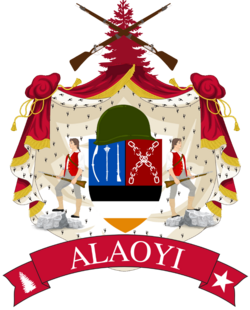Federation of Alaoyian Fullball: Difference between revisions
(Created page with "{{Infobox sports league | title = Federasie van Koueland Volbal | Formerly = | current_season =2022-2023 FKV Season | logo = FKV Shield.png | pixels = 190px | sport = Bierb...") |
No edit summary |
||
| (2 intermediate revisions by the same user not shown) | |||
| Line 5: | Line 5: | ||
| logo = FKV Shield.png | | logo = FKV Shield.png | ||
| pixels = 190px | | pixels = 190px | ||
| sport = [[ | | sport = [[Fullball]] | ||
| founded = {{start date and age|1961|5|17}}<br />[[Seaside (Alaoyi)|Seaside]], [[Obodo-On-Osimiri]], [[Alaoyi]] | | founded = {{start date and age|1961|5|17}}<br />[[Seaside (Alaoyi)|Seaside]], [[Obodo-On-Osimiri]], [[Alaoyi]] | ||
| commissioner = Pieter Van Den Heever | | commissioner = Pieter Van Den Heever | ||
| Line 22: | Line 22: | ||
The FKV was formed in 1961 as three leagues, the '''Kouelander Liga''' (Fluvan: Alaoyian League), or KL, the '''Sraith an Iarthair''' (Fluvan: Western League), or SaI, and the '''Obodo-Ukwu Njikọ''' (Fluvan: Metropolitan League), or OUN, united into a federation called the Federation of Alaoyian Fullball. The stage for the league was set as early as 1952, where each league, after initially determining champions through end-of-season standings, played a three way double elimination playoff system that culminated with the Fullball Championship Game. Following an agreement to merge the three leagues, the FKV was formed in 1961 with the championship game being played amongst the four conferences. The FKV one of the highest average attendances (54,910) of any professional sports league in the world and is the most popular sports league in Alaoyi. The Great Cup game is also among the biggest single-nation sporting events on Manala, with an estimated 68% of Alaoyians viewing at least part of the game. | The FKV was formed in 1961 as three leagues, the '''Kouelander Liga''' (Fluvan: Alaoyian League), or KL, the '''Sraith an Iarthair''' (Fluvan: Western League), or SaI, and the '''Obodo-Ukwu Njikọ''' (Fluvan: Metropolitan League), or OUN, united into a federation called the Federation of Alaoyian Fullball. The stage for the league was set as early as 1952, where each league, after initially determining champions through end-of-season standings, played a three way double elimination playoff system that culminated with the Fullball Championship Game. Following an agreement to merge the three leagues, the FKV was formed in 1961 with the championship game being played amongst the four conferences. The FKV one of the highest average attendances (54,910) of any professional sports league in the world and is the most popular sports league in Alaoyi. The Great Cup game is also among the biggest single-nation sporting events on Manala, with an estimated 68% of Alaoyians viewing at least part of the game. | ||
The Cathaisce Bears hold the most FKV championships with seven. However, counting in the 1952-1961 championship games it is the Boeredorp Shamrocks with eight titles, winning three Championships and five Great Cups. However, the FKV considers the Great Cup to be a separate trophy. The [[Vyrehawe Oilmen]] are the reigning league champions, as they defeated the [[Zeberg Barbarians]] | The Cathaisce Bears hold the most FKV championships with seven. However, counting in the 1952-1961 championship games it is the Boeredorp Shamrocks with eight titles, winning three Championships and five Great Cups. However, the FKV considers the Great Cup to be a separate trophy. The [[Vyrehawe Oilmen]] are the reigning league champions, as they defeated the [[Zeberg Barbarians]] 49-39 in the [[60th Great Cup (Alaoyi)|60th Great Cup]] on February 20, 2022, to mark the end of the 2021-2022 season. | ||
=History= | =History= | ||
| Line 44: | Line 44: | ||
=Media Coverage= | =Media Coverage= | ||
=Minor Leagues Draft= | =Minor Leagues Draft= | ||
{{Alaoyi topics}} | |||
{{Manala topics}} | |||
[[Category:Alaoyi]] | |||
[[Category:Galia]] | |||
[[Category:Manala]] | |||
Latest revision as of 17:45, 24 October 2023
| Current season, competition or edition: | |
 | |
| Sport | Fullball |
|---|---|
| Founded | May 17, 1961 Seaside, Obodo-On-Osimiri, Alaoyi |
| Inaugural season | 1961-1962 Season |
| Commissioner | Pieter Van Den Heever |
| No. of teams | 32 |
| Country | Alaoyi |
| Headquarters | Pinetown, Alaoyi |
| Most recent champion(s) | Vryehawe Oilmen (2nd title) |
| Most titles | Cathaisce Bears (7 titles) |
The Federasie van Koueland Volbal (Fluvan: Federation of Alaoyian Fullball) (FKV) is a professional Bierbal league that consists of 32 teams, divided equally between the Western, Eastern, Central, and Metropolitan Conferences. The FKV is one of the major professional sports leagues in Alaoyi and the highest professional level of bierbal in the world. Each FKC season is an 18-week regular season which runs from early September to early January, with each team playing 16 games and having two bye weeks. Following the conclusion of the regular season, three teams from each conference (two division winners and a best-second team) advance to the playoffs, a single-elimination tournament that culminates in the Great Alaoyian Cup, which is contested in February and is played between the final two teams remaining. The league is headquartered in Seaside.
The FKV was formed in 1961 as three leagues, the Kouelander Liga (Fluvan: Alaoyian League), or KL, the Sraith an Iarthair (Fluvan: Western League), or SaI, and the Obodo-Ukwu Njikọ (Fluvan: Metropolitan League), or OUN, united into a federation called the Federation of Alaoyian Fullball. The stage for the league was set as early as 1952, where each league, after initially determining champions through end-of-season standings, played a three way double elimination playoff system that culminated with the Fullball Championship Game. Following an agreement to merge the three leagues, the FKV was formed in 1961 with the championship game being played amongst the four conferences. The FKV one of the highest average attendances (54,910) of any professional sports league in the world and is the most popular sports league in Alaoyi. The Great Cup game is also among the biggest single-nation sporting events on Manala, with an estimated 68% of Alaoyians viewing at least part of the game.
The Cathaisce Bears hold the most FKV championships with seven. However, counting in the 1952-1961 championship games it is the Boeredorp Shamrocks with eight titles, winning three Championships and five Great Cups. However, the FKV considers the Great Cup to be a separate trophy. The Vyrehawe Oilmen are the reigning league champions, as they defeated the Zeberg Barbarians 49-39 in the 60th Great Cup on February 20, 2022, to mark the end of the 2021-2022 season.
History
Governance
Teams
Season Format
Regular season
Currently, the 13 opponents each team faces over the 16-game regular season schedule are set using a pre-determined formula: The league runs an 18-week, 256-game regular season. Since 2021, the season begins on the first Monday of September that is not the first day of the month and concludes the week after New Year. The opening game of the season is a home game on a Monday for the league's defending champion. Most FKV games are played on Saturdays and Sundays, with a Monday night game typically held at least once a week. Games are rarely scheduled for any other day.
FKV regular season matchups are determined according to a scheduling formula. Two games (home and away) are played against the other three teams in a division, while one game is held against all the members of a division from another conference, rotated yearly. Two of the other games are polar games, determined by the standings of the previous year – for example, if a team finishes first in its division, it will play the other first-place team and the fourth-place team in another division, while a team that finishes third would play the other third place team and the second place team in the other divison. The final four games are similar finishers, where a team plays the similar finisher from four randomly selected divisions. This means that a team finishing first in its division will play the first place in the other divisions. Either the polar games or one of the similar finisher games will be against a team in a team's conference's other division.
Although a team's home and away opponents are known by the end of the previous year's regular season, the exact dates and times for FKV games are not determined until much later because the league has to account for events that could pose a scheduling conflict with FKV games. During the 2010 season, over 500,000 potential schedules were created by computers, 5,000 of which were considered "playable schedules" and were reviewed by the FKV's scheduling team. After arriving at what they felt was the best schedule out of the group, nearly 50 more potential schedules were developed to try to ensure that the chosen schedule would be the best possible one.
Postseason
Following the conclusion of the regular season, the FKV Playoffs, a 12-team single-elimination tournament, is then held. Three teams are selected from each conference: the winners of each of the two divisions as well as the best-second (the remaining team with the best overall record, with tiebreakers in the event of two or more teams having the same record). These teams are seeded according to overall record and tiebreakers, but the best team in each conference is given a bye the first round. The seeding is conducted without regard for divisional winners in numbering, but the divisional winner will always get homefield advantage if it is going against a best-second team. If two best-seconds or two divisional winners are going against each then the higher seed receives homefield advantage. The 8-seed plays the 9-seed, the 5-seed the 12-seed, the 6-seed the 11-seed, and the 7-seed the 10-seed.
The winners of the first round advance to the second round, which matches the lowest seeded remaining team against the 1-seed, the second lowest seed against the 2-seed, the third lowest remaining seed against the 3-seed, and the fourth lowest remaining seed against the 4-seed. The winners of those games then compete in the third round, with the highest remaining seed hosting the lowest remaining seed and the two remaining teams mached together. The survivors of the third round compete in the Great Cup.
